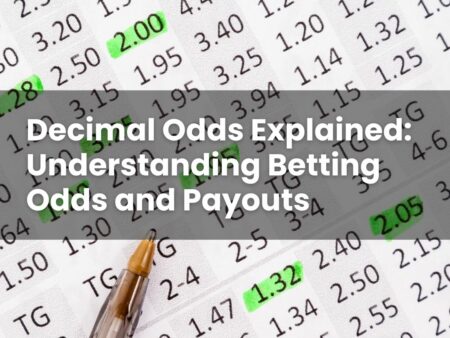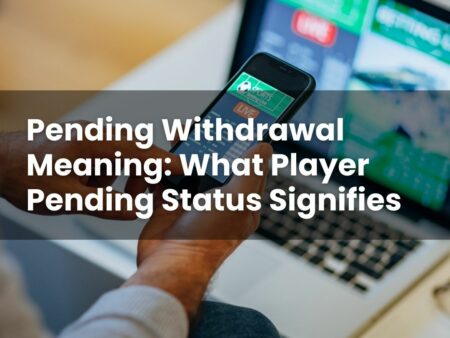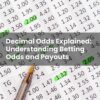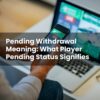Whether you are placing your first bet or you have used bookmakers for years, it is natural to wonder what happens to your odds once your bet is confirmed. Stories and screenshots online can make it seem as if prices shift after the fact.
With so many ways to place a bet today, from a local shop to your favourite site, it might help to know which rules protect you once you have potentially staked your money.
If you want to understand what is fair, what is allowed, and how the rules apply when a bet is accepted, read on to find out how it works in practice.
Can Bookies Change Odds After Placing a Bet?
If a bookmaker accepts your bet, the odds shown at that moment normally stand. In the UK this is the standard position for fixed-odds betting, whether the bet is placed in a shop or online. Your potential return is calculated using the price you saw and agreed to at the time.
UK operators are regulated, and a core expectation is that the terms of a bet, which include the odds, are agreed when the bet is accepted. That way you know where you stand before the event starts.
There are rare exceptions. The most common is an obvious mistake, often called a palpable error. For example, if a price is entered as 20/1 when it should clearly be 2/1, the bookmaker may correct or void the bet in line with its published rules. Reputable sites set out how they handle such situations and are expected to explain any decision clearly.
If you do decide to try your hand betting at the bookies, remember to do so responsibly and within your means; never wager more than you can afford to lose.
How Betting Odds Work and Why They Change
Odds reflect the assessed chance of an outcome and the return offered if the bet succeeds. In the UK they are usually shown as fractions like 2/1 or 5/2, though many sites also offer decimals.
Bookmakers set prices using form, injuries, statistics, expert opinion and trading models. Markets also react to where the money goes. If a lot of bets arrive on one side, the price may shorten to manage potential payouts and keep the book balanced. New information can shift things too, such as a striker being ruled out on match day or a late change to the going in horse racing.
In fast-moving markets, particularly in-play and before major events, prices can update quickly as information and betting volumes change. Each operator may apply slightly different methods, which is why you might see small variances across sites.
What Happens to Your Bet If Odds Change After You’ve Placed It?
For fixed-odds bets, once your bet is accepted the price is typically locked for that wager. If the market moves a few seconds later, those new odds apply only to new bets. Your slip keeps the price it was accepted at.
There are limited exceptions:
- Palpable error, where a clear pricing mistake is corrected under the site’s rules.
- If you deliberately chose a Starting Price on a horse or greyhound bet, the return is based on the official SP declared at the off rather than the price shown when you placed the bet. That is a different product to taking a fixed price, so the treatment is explained on the market page before you confirm.
When a correction is made, operators usually contact the account holder or update the bet record with the reason. The key point is that changes should follow the written rules for that market and be explained in plain terms.
Can Bookies Void or Adjust a Bet After It’s Been Accepted?
Bookmakers usually honour accepted bets, but certain situations can lead to a void or adjustment.
The clearest example is a palpable error, where the displayed information was plainly wrong and out of line with the market. In those cases, sites often either correct the price to the intended level or void the bet entirely, depending on their stated policy.
Event changes can matter too. If a match is postponed, abandoned or materially altered, the market rules decide what happens next. Some bets settle when an official result is confirmed within a set time window, while others are voided and stakes returned if that window passes.
In horse racing, a non-runner declared after you placed a fixed-odds bet can trigger a Rule 4 deduction to winnings. This reflects the reduced field and is applied according to a published scale. The original stake is not taken away; the deduction only applies to the return.
Other unusual cases include data feed faults, obvious mis-settlement, or bets placed after the relevant stage of play has started when they should not have been available. Reputable operators outline how they handle each of these, apply the same rules to everyone, and explain the decision.
What You Can Do If You Think Your Bet Was Changed Unfairly
If something looks off, the bet receipt or account history is the best place to check the exact terms that were accepted, including the price, time stamp and market rules. That record shows what you agreed to and helps identify whether a later change was made and why.
Customer support can then review the bet against the site’s rules. It helps if they have the bet number, when it was placed and a short summary of the concern. Most operators will escalate the case for a formal review if the initial reply does not resolve it and will point you to their complaints process.
If a dispute cannot be settled directly, you can ask for it to be reviewed by an independent Alternative Dispute Resolution (ADR) service. Details of approved ADR providers and how to escalate a complaint are set out on the operator’s website and explained on the regulator’s site. Always keep responsible gambling practises in mind.








